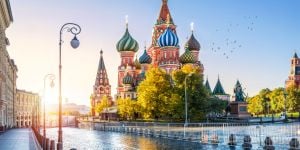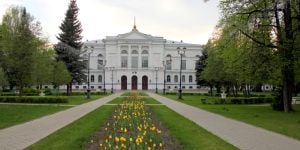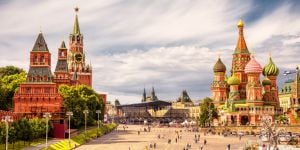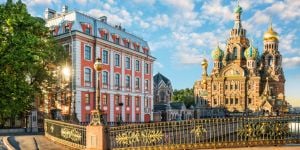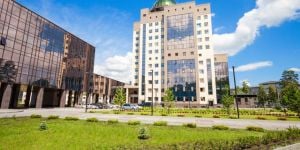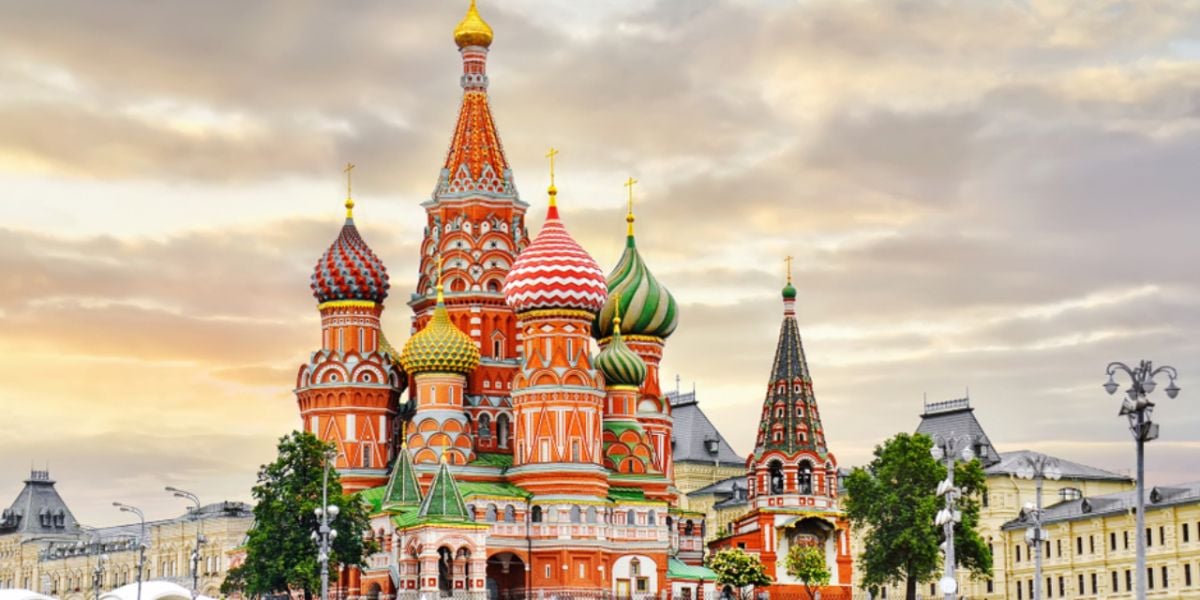
Russia's capital city has always conjured up some kind of mysterious fascination amongst foreigners. Despite all the stereotypes which have persisted over time, Moscow is a very safe and nice place to live and there is much more to do in winter than just hibernate in your flat!
For the past few years, the city has been modernizing its infrastructure, roads and pedestrian zones, shopping malls, parks and even inhabitants' mentality at an incredible pace, drastically improving Muscovites' quality of life. Despite the economic sanctions, Russia's capital city has managed to remain a highly popular destination. Old and new mix in the economic, historic and political heart of Russia like nowhere else in the country. The whole of Russia's history is reflected by Moscow's tsar palaces, soviet sights and modern skyscrapers.
In addition to its fascinating architecture and magical secret gardens, Moscow has many places of interest for young people and regularly hosts important world events - economic summits, football world cup, world athletic championship - and countless debates with forward thinkers, journalists and politicians in its top universities. Sport is also a big part of student life in Moscow and you will find many options to practice all sorts of sports; from student clubs to free marathons and sports equipment in the city's parks.
Best Universities in Moscow
Higher School of Economics
The Higher School of Economics (HSE) is one of Russia's youngest universities and was founded shortly after the collapse of the USSR by a group of economics lecturers who felt the need to implement new teaching to address the changes the country was facing, as well as to meet global economics education standards. Since then, the university has developed an expertise in economics and social sciences where it is ranked respectively 51 and 155 out of 404 on the QS top universities. Based in Moscow, it has branched out to Saint Petersburg, Nizhni Novgorod and Perm. In 1997 it became one of the first Russian universities to implement double degree awards with western universities. As of today, the HSE offers double degree awards in 40 fields of study, including economics and finance, logistics, public and municipal administration, business informatics, sociology, political science, psychology, philosophy and law.
The HSE is amongst Russia's top universities and has developed several partnerships with high ranking Western universities such as the London School of Economics and the Sorbonne (Paris I). Although the institute has built its reputation on inviting a significant number of foreign students only 7% of its 26,408 students are foreigners. It is not rare to have foreign students coming to study at the HSE without any prior knowledge of Russian language since the university offers hundreds of courses taught in English, from computational science to international affairs. Students who can prove a B1 level of Russian (certificate required) can apply to courses taught in Russian. Highly interactive Russian classes from beginner to advanced are included in English only taught courses for students who wish to make the most of their time in Russia and improve their language skills.
As for professors, the HSE still lags behind international research standards and hires very few foreign teachers. Their recruitment is decided by a committee which still favours Russian academics having completed part of their studies in western universities as opposed to foreign academics with foreign degrees.
Moscow's campus is spread across the city's districts and it is common practice to send students of one program to have classes in three or four different buildings at opposite ends of the city, sometimes on the same day. Therefore students should be ready to run between classes, buildings and metro stations, which can be a bit confusing and sometimes leads to missing part or all of lessons. It is also common practice for Russian professors to have two jobs and therefore to arrive half an hour late, miss classes or leave after half an hour of teaching to go to a conference. Some professors insist on monitoring students' attendance and this usually reflects on the students' marks at the exam and can be decisive as to whether an exam is passed or failed.
To enrol at the HSE you will need to provide your previous degrees, together with an official apostille from the Cour d'appel of the region where you completed your degree and your degree and all your academic transcripts translation certified by the Chamber of Commerce of the region where you completed your degree. Note that you will need to show and leave the original documents with the university several months. Finally, note that all international students are entitled to a place in the university's dormitories. You can find more information on the dormitories options and prices on the university's website.
Moscow State University (MSU)
Moscow State University is Russia's largest and second oldest institution. It is also one of the most majestic sights in Moscow. Out of the 38,150 students studying at MSU, about 10% come from abroad. Being Russia's top university means that MSU possesses an impressive campus spread across 1,000 km2 and one of Russia's most well-stocked libraries with 9 million books available to its students and researchers. Twelve nobel prizes laureates graduated from the ranks of MSU, such as Doctor Zhivago's author Boris Pasternak, pioneering nuclear scientist Andrei Sakharov and former Soviet president Mikhail Gorbachev. On top of that, MSU has several branches in the former USSR: Sebastopol, Crimea, Astana, Kazakhstan, Tashkent, Uzbekistan, Baku, Azerbaijan, Dushanbe, Tajikistan and Yerevan, Armenia.
Moscow State University is particularly well ranked in mathematics, linguistics, natural sciences, computer science, physics and astronomy. The vast majority of courses are taught in Russian but a few courses in biology, geology, business, economics and political science are taught in English. MSU has enjoyed the most prestigious reputation amongst Russian universities for decades and selection of applicants is stricter than in other top Russian universities. In order to enrol at MSU you will have to pass two entry exams. To find out more about the required documents and the different steps in the application procedure at MSU click here.
Foreign students are provided with a room in the university's dormitories. Some dormitories are located right on the main campus, whilst others are much further away. Prices vary between â¬60 and â¬190 per month depending on the room's comfort and on the number of roommates. When choosing your accommodation during your studies in Russia, be aware that you will rarely find the same level of modernity, cleanliness and space per occupant as in Western universities. Students in Russia are expected to share their room with up to 5 roommates. The common facilities such as the bathroom and the kitchen are usually in a poor state with old machines and shared by an entire floor. Roommates may agree on taking turns to welcome their friends or not. In the latter case your roommate could invite his or her friends over and have them take your bed in your absence. This is common practice when a roommate is out for the weekend or the holidays.
MGIMO
Moscow State Institute of International Relations was born from the split of Moscow State University's faculty of international relations in 1944. The institute considers itself the national leader of education and expertise in international relations and indeed this remains the core faculty of MGIMO. Since its creation, eleven other faculties have been opened at MGIMO. They offer various programs taught in Russian and/or in English in the following fields. The university has 170 partner universities from 50 countries and offers seven dual-degrees with top world universities such as Sciences Po and St Andrews. MGIMO not only is reputed for its high-quality teaching and training but it also holds the world record for the highest number of languages taught in an academic institution and all 53 languages it offers are taught to advanced level. MGIMO has been the alma mater of many foreign affairs ministers, UN envoys, ambassadors, UNESCO, OSCE and EU top officials and even to KGB officers. Students are offered various opportunities to put their knowledge into practice and improve their public speaking and negotiating skills through debates with prominent guests or in student societies.
MGIMO has a much smaller student body than the HSE and MSU with a total of 7,552 students but the highest percentage of international students amongst Russia's top three universities: over 17% of its students come from 30 different countries. To enrol at MGIMO, international students need to undergo an interview and pass a Russian language test or provide a B1 certificate. Requisite documents must be sent to the international students' department between June 20 and July 10 but you are advised to check updated deadlines on the university's website. The university campus has 1,800 accommodation places. Dormitory rooms can be provided to international students upon request three months before their arrival. Dorms are more modern than in MSU, all rooms are shared by a maximum of three students and come with toilets and shower facilities, costing on average â¬100 per month. Some dorms are composed of several individual flats with two or three bedrooms for up to six people. These flats have their own kitchen and bathroom but it is worth noticing that they are located much further away from the main campus.
For more information on how to apply to MGIMO click here.
Student visa for Russia
To study in Russia you will need a visa. If you are already living in Russia on a work visa when applying to university, you may keep your visa so as to be able to keep working if you wish. If you do not have a visa you will need to apply for a student visa. Once your application has been accepted, the university will send you an invitation letter to apply for a visa in your home country. Documents required for a student visa may vary from one country to another but in most cases you will need to provide the Russian consulate or embassy with the following:
- Your passport;
- A copy of the first two pages of your passport;
- An ID photo;
- A completed application form;
- An insurance policy valid for the first three months of your stay;
- The letter of invitation from the university;
- The proof of payment of the visa fees.
Student job and Internship in Moscow
While living in the university's dormitories might be relatively cheap, for those who prefer the comfort and independence of an individual flat, it might be necessary to find a job to pay their rent and bills. Foreign students are not allowed to work officially whilst staying in Russia on a student visa. However, if you find a company ready to provide you with visa support you can work on their visa whilst studying. This is the safest way to combine studies, usually for evening courses, with work during daytime. Note that some international students go round the regulations by giving private lessons at the clients' home or working remotely and being paid in cash.
It is also illegal for international students to do a paid internship. Nevertheless, some companies do not mind paying their interns in cash instead of bank transfers so as not to leave any proof of payment. Whether you can receive a salary or not is to be negotiated on an individual basis with the company. In some cases, in particular with the Higher School of Economics, the university accepts internships completed up to one year before the start of the course. In this case, students have to show an internship report and a letter signed and stamped from the company in which they did their internship. It is best to check with your academic advisor beforehand whether your university takes into account previous internships. For unpaid internship options, your university in Russia may help you in your research. Sometimes they have a list of partners that take on a few students from the university each year. You will still have to go through the selection process, apply for the internship, write a cover letter etc. Your academic advisor will also provide you with the contract that you will have to sign with the company.
Fees and scholarships
HSE
The cost of one year of study at the HSE varies between â¬3,000 and â¬5,400. Exchange, visiting or dual-degree students may apply for a scholarship at their home university. For everyone else doing a full Russian degree, you may try your luck and apply for the Russian government scholarship for foreign students. Not that the Russian government scholarships cover the full cost of tuition fees and some extra money is transferred to the student's student card if they choose to live in the university dormitories.
MSU
Tuition fees at MSU vary between â¬2,850 and â¬5,830 per year. The university does not offer scholarships to international students. However, exchange or visiting students may apply using the scholarship options available in their home country and full Russian degree students may apply for the Russian government scholarship.
MGIMO
Most undergraduate and postgraduate programs cost from â¬6,000 to â¬7,100 per year. The institute does not offer scholarships to foreign students but you may apply for the Russian government scholarship. The various steps of the procedure are explained here.
Finding accommodation in Moscow
For those who prefer independence and privacy, university dormitories might not be the most suitable option. If you wish to have your own bedroom but are not too bothered about sharing the rest of the facilities with other people, you may find a decent and central room from â¬365 per month and count from â¬610 for a one bedroom flat.
Some useful websites:
Student lifestyle and leisure in Moscow
Moscow is an incredibly vibrant city with many leisure options for students. In fact, Russia's capital city may be one of the best places to enjoy your student life with most sights offering significant discounts or even free entrance to students. Parks offering sport activities and master classes, weekly language meetings in cafes, folklore festivals, food markets, outdoor concerts and spectacles, you will simply not run out of things to do! You can also visit some of the city's 447 museums, exhibitions, 159 theatres, cathedrals and churches, and other historic and cultural sites, as well as modern art centres (Winzavod, Flacon, Artplay). Russia's most majestic theatre, the Bolshoi, offers between 30 to 84 tickets per show to students at an incredibly low price (â¬1,50).
Useful websites (in Russian) on what's going on in Moscow:
www.2do2go.ru
mos-holidays.ru
pro-stranstva.ru
www.vashdosug.ru
www.afisha.ru
Note that most universities have an extensive network of student societies which organise weekly events in and around Moscow. They also enable local students to pair up with newly arrived international students to help and advise them on their everyday life.
Getting around in Moscow
Moscow is a very large city and you will sometimes have to travel a few hours to get to a specific place but transportation is very efficient and cheap for students. It costs â¬5 for a monthly unlimited metro card and another â¬5 to use all buses, trams and trolleybuses. Moscow's metro is one of the deepest in the world because it was built to serve as a bunker during WWII, it is also magnificently decorated. The city is also covered by 905 bus, trolleybus and tramway routes. An increasing number of bus stops have been modernized and some even have USB plugs and free wifi, just like in the metro.
Cost of living in Moscow
Your accommodation budget will depend on what kind of accommodation you choose. If you chose to live in the dorms, food will be your main expense. Expect to spend around â¬220 per month at the supermarket, â¬2.20 for lunch at the university's canteen and â¬9 to eat out in a decent restaurant. A taxi in the city centre costs between â¬2,20 and â¬6,60 depending on the time and distance you travel. The city counts a great number of taxi companies offering competitive prices and several payment methods. As of September 2017, Uber seems to be offering the most attractive prices and the best client service. Beware of Yandex taxis as they do not always handle client complaints and do not offer refunds or discounts when their app or website have crashed and made you pay for unfulfilled trips. Avoid unofficial taxis when travelling alone.
We do our best to provide accurate and up to date information. However, if you have noticed any inaccuracies in this article, please let us know in the comments section below.
